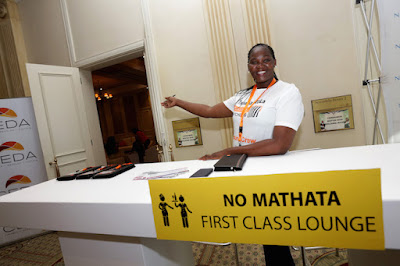By the time you read this, assuming there hasn’t been earthquakes, lightning strikes or alien abductions, the Consumer Watchdog team will be lying down, having a day off, trying to recover from the exhaustion of the last two days, from the 2015 Consumer Watchdog Conference. Don’t bother calling the office, we’ll be too tired to even pick up the phone.
With luck you’ll see some of the pictures and newspaper coverage of the event that will show that the conference, like last year’s, was very different to other conferences.
I’ve spent a small but significant proportion of my life in conferences, ether speaking or in the audience and the thing that they all have in common is that they can be incredibly boring. Even when the content of the speeches is useful, the approach can be wickedly dull.
But our conferences are different. I believe that in all areas of life, whether it’s our relationships, our jobs or our free time things are always best when we’re having fun. Why can’t it be the same with a conference? Why can’t there be comedy, theatre, music and dance in a conference? Of course the content must be serious, informative and educational but why can’t it be fun as well?
A company called us a few weeks ago enquiring about the conference. “We’ve heard it’s going to be fun”, they said. Yes, we said, it certainly is and then we told them about the speakers and workshops but that we were deliberately inserting fun into the equation. “Then we can’t come”, they told us, “we want it to be serious.”
I’m glad they didn’t come. Who wants people sitting at an entertaining event who look like they’re at a funeral? We certainly don’t.
[Update: They eventually booked a place. Maybe they DO like fun after all?]
We also do our best to be optimistic and despite what some pessimists and professional complainers will tell you, there is plenty of reason to be positive about service in Botswana. Yes, there remain many challenges and there are plenty of organizations who are bad at customer service but there are also many who are doing their very best to make things better.
Do you need examples?
In just the last year we have received celebrations of around 200 service stars. Thirteen of these were celebrated at this year’s conference as service stars, people who are going places. Of the service stars we celebrated in 2014 almost all of them have gone on to better things in the subsequent year. Several have been promoted, one has opened another store, one even left his employer and started his own company in competition with them. They are all examples of what can happen to you and your company when you offer your customers what they deserve. And then give them even more.
I have a confession to make. I was becoming more and more disillusioned about the talk we constantly hear about “Botho”. It seemed to be the sort of thing that politicians and business leaders spoke about but which might not convert into real actions. But that changed in the last few weeks. I’ve met botho in the people we’ve been celebrating. I’ve also seen it in their bosses who are enormously proud of their staff who have been celebrated. One of the MDs told me that their service star, one who we celebrated, was “family” to him and that they were grooming her for a position at a very high level. Last year two of the happiest people I saw at the conference were the two senior managers from a company seeing one of their most junior staff being celebrated by Former President Mogae and everybody else at the event. This year was the same. Proud managers witnessing the people they had trained and developed being recognized as ambassadors for their companies and their country.
Above all other things, this year the conference had a purpose. To dispel the myth (perhaps even “the lie”) that there is something about Botswana and its people that means we aren’t capable of offering excellent customer service. That there is something in our national bloodstream, our heritage, our culture that means we’re incapable of offering the level of service customer want.
Utter rubbish. Complete nonsense.
I have a very strong belief that some of us use this myth as an excuse. For instance I met a middle-aged woman recently who said it was culturally impossible for her to greet a customer if he was young enough to be her son or nephew. “He should be greeting me”, she said. I was tempted to say something callous like “Get over it, he’s paying your salary” but instead I suggested that she should treat this customer exactly as if he WAS her son or favorite nephew. Smile at him the way you would if your son or nephew walked into the room. He’ll love it. Imagine you were a young guy. Wouldn’t you like a bank cashier or waitress who was like your Mum or favorite Auntie?
The real truth is the complete opposite to this idea that we can’t do service in Botswana. The values we cherish, the ones we say define us as a people, are the very same values that equip us to offer the best service in the world. Maybe not the fastest, perhaps not the most sophisticated but nevertheless the warmest and most courteous.
So the message from the conference was simple. There s nothing stopping us from offering customer service not just “as good” as elsewhere, but better than elsewhere. That’s what we need if our national ambitions are to be realized.
And there’s nothing stopping us.



































